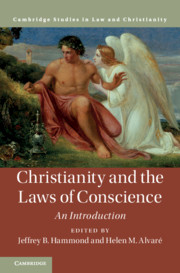Book contents
- Christianity and the Laws of Conscience
- Law and Christianity
- Christianity and the Laws of Conscience
- Copyright page
- Dedication
- Contents
- Contributors
- Acknowledgments
- Introduction
- Part I Themes in Understandings of Conscience in Christianity
- Part II Conscience According to Major Figures and Traditions
- Part III Applied Topics in Law and Conscience
- 15 Liberty of Conscience, Free Exercise of Religion, and the US Constitution
- 16 Religious Conscience Protections in American State Constitutions
- 17 Forced Conformity or Accommodation?
- 18 Christian Conscience and Sexual Expression Rights
- 19 Conscience and the Roman Catholic “Just War” Tradition
- 20 Institutional Conscience, Corporate Persons, and Hobby Lobby
- 21 Religion, Conscience, and the Law
- Index
- References
15 - Liberty of Conscience, Free Exercise of Religion, and the US Constitution
from Part III - Applied Topics in Law and Conscience
Published online by Cambridge University Press: 12 June 2021
- Christianity and the Laws of Conscience
- Law and Christianity
- Christianity and the Laws of Conscience
- Copyright page
- Dedication
- Contents
- Contributors
- Acknowledgments
- Introduction
- Part I Themes in Understandings of Conscience in Christianity
- Part II Conscience According to Major Figures and Traditions
- Part III Applied Topics in Law and Conscience
- 15 Liberty of Conscience, Free Exercise of Religion, and the US Constitution
- 16 Religious Conscience Protections in American State Constitutions
- 17 Forced Conformity or Accommodation?
- 18 Christian Conscience and Sexual Expression Rights
- 19 Conscience and the Roman Catholic “Just War” Tradition
- 20 Institutional Conscience, Corporate Persons, and Hobby Lobby
- 21 Religion, Conscience, and the Law
- Index
- References
Summary
Nathan Chapman considers the link between free exercise and freedom of conscience in the US Constitution and legislation. Some theorists emphasize the similarity between religion and other moral or philosophical commitments and insist there is no reason to privilege the former over the latter. However, for the founding generation, freedom of conscience meant religious freedom, exercised as a response to one’s duty to God. Courts and legislatures often negotiate different relationships between freedom of religion and of conscience. Speech, press, and association rights have been employed to protect conscience. And some state and federal statutes accommodate religion and other commitments under the label of conscience. However, the Free Exercise, Establishment, and Equal Protection Clauses have not been interpreted to prioritize nonreligious conscience. The Supreme Court has interpreted the law about conscientious objection to military service to include non-theistic beliefs. Some statutes accommodating religion also protect nonreligious beliefs or practices, for example, statutes governing abortion, physician-aided suicide and capital punishment.
Keywords
- Type
- Chapter
- Information
- Christianity and the Laws of ConscienceAn Introduction, pp. 287 - 304Publisher: Cambridge University PressPrint publication year: 2021

